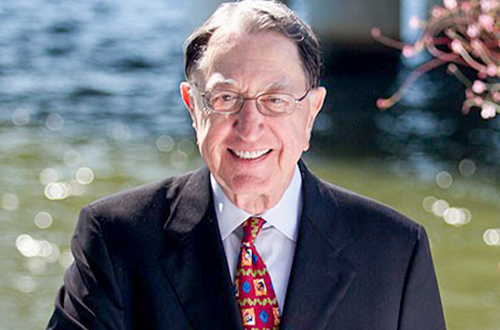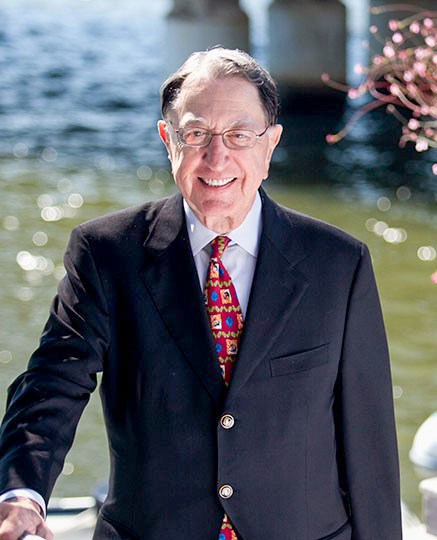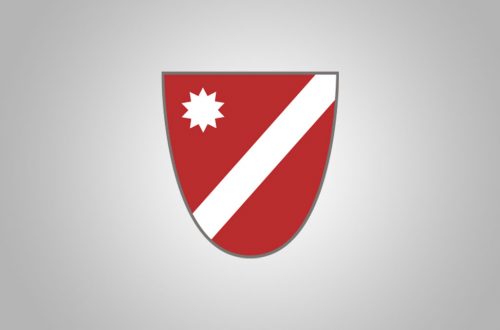
Musician, Academic, Entrepreneurial Expert: The Multi-faceted Career of Rudolph Phillip Lamone
By Joseph “Sonny” Scafetta, Jr.

Rudolph Phillip Lamone was born on December 20, 1931, in Wellsburg (population 6,398 in the 1930 Census), a town on the east bank of the Ohio River in the panhandle of West Virginia. His parents, Domenico Lamone and Maria Branchi Lamone, had emigrated from the Abruzzi region of Italy. Like many Italian-American boys growing up in hardscrabble areas during the Great Depression, Rudolph and his younger brother Eugene acquired nicknames, Rudy and Beef.
As a teenager, Rudy became a proficient saxophonist and planned to be a professional musician. After he turned 16 and got his driver’s license, he would drive 45 miles to Pittsburgh, Pennsylvania, on Saturday evenings. Using the end of a burned Italian wine bottle cork, he would create a fake stubble on his face and lie about his age so that he could get into nightclubs through dimly lit rear entrances to sit in on jam sessions. After he graduated from Wellsburg High School in 1949, he toured the nation with different big bands. Eventually, he formed his own Rudy Lamone Band which opened for major acts at some area concerts.
During the Korean War, he enlisted in the U.S. Army in 1952. After he completed basic training, instead of being shipped to fight in Korea, he was held at Fort Bragg in North Carolina to play the saxophone for the 440th Army Band. After his three-year tour of duty was up in 1955, he was honorably discharged. With the change in music tastes from swinging big bands to rock and roll in the mid-1950s, Rudy decided to put aside his saxophone and give up on his dream of becoming a professional musician. Thus, he applied to Campbell College (now University) 30 miles away from Fort Bragg in Buies Creek, North Carolina. He was admitted and used the G.I. Bill to study business administration full time. He graduated three years later in 1958 with a bachelor of arts degree.
At the age of 27, he enrolled in the University of North Carolina (UNC) at Chapel Hill. He earned a master’s degree in business administration (MBA) and then a Ph.D. in the same subject in 1966. While attending UNC, he became a member of Phi Beta Kappa and Beta Gamma Sigma.
After graduation from UNC at the late age of 34, he applied for a position as an assistant professor and was hired to teach business courses starting in September 1966 at the University of Maryland in College Park. While teaching undergraduates, he met Linda Hefler who was studying marketing in one of his classes. After she earned her bachelor’s degree in May 1969, the 38-year-old Rudy married the 23-year-old Linda in mid-1970. They had no children.
Climbing the academic ladder, he was appointed dean of the Robert H. Smith School of Business beginning in the Fall of 1973 at the age of 41. He inherited a program with a mediocre reputation. It was also hampered by limited resources and overwhelmed by mostly average students. Prior deans spent their time fund raising and managing staff. Instead, Rudy’s primary focus was the students. He helped them with their personal problems and used his contacts throughout the nation to help them get good positions. He came to care for his students so much that he began to call them “my kids” since he had no kids of his own.
Rudy understood the evolving role of entrepreneurship in business. At that time, academics generally believed that entrepreneurship was a subject that was not important enough to study. However, to the contrary, Rudy thought that it should be a student major. Thus, Rudy established the Dingman Center for Entrepreneurship which was named in honor of Michael D. Dingman, a University of Maryland graduate who endowed the Smith School with a $1 million gift. The Dingman Center now helps launch 50 to 100 ventures every year. Rudy also created the Dingman Center Angels (DCA) to bring regional start-up companies seeking early-stage funding to the attention of local investors. The DCA was the first of its kind and is still the largest university-run angel investor network in the United States.
As a result of Rudy’s work, the Dingman Center was the first to receive the prestigious Nasdaq Award as a center of excellence in entrepreneurship from the Global Consortium of Entrepreneurship Centers. Rudy then co-founded the National Consortium of Entrepreneurship Centers and the National Consortium for Life Science Entrepreneurship Programs.
In 1976, Rudy was appointed to the Baltimore District Advisory Council for the Small Business Administration. In 1988, the Smith School of Business received the Outstanding National Educational Institutional Award from the National Black MBA Association because of Rudy’s recruiting of Black students who would earn MBAs. In 1990, Japanese entrepreneur Soji Kanazawa visited the Dingman Center and was so impressed by Rudy’s tour that he donated $300,000 to fund student exchange trips to Japan. He then returned to Japan and founded an entrepreneurship school modeled on the Dingman Center.
In 1992 at the age of 60, Rudy decided to retire as dean. Upon his departure, the Dingman Center established the annual Rudy Awards and the dining facility was renamed Rudy’s Café in his honor. Also, Leon Van Munching, a 1950 Maryland graduate, established the Rudolph P. Lamone Chair for Entrepreneurial Leadership. Additionally, colleagues and friends established the Rudolph P. Lamone Fund for Excellence in Entrepreneurship to help support innovative programs, student summer internships, new lecture series, and other student educational activities.
The couple then moved from College Park and settled in Annapolis on the Chesapeake Bay at the mouth of the Severn River. Not one to rest on his laurels, Rudy decided to practice what he preached. Rudy co-founded Direct Gene, Inc., an Annapolis biotech firm that develops gene therapies directed towards treating metastatic prostate and breast cancers. He also joined Gabriel Venture Partners in Annapolis. In 1996, the accounting firm of Ernst & Young named him Entrepreneur of the Year. In 1998, Rudy was awarded the President’s Medal by the University of Maryland. With the fortune that he made Rudy then established the Lamone Endowed Chair for Entrepreneurial Leadership. Despite his busy work schedule, Rudy would return to the Smith School from time to time to spend hours coaching and mentoring entrepreneurial students.
After selling his interest in Direct Gene, Inc., and withdrawing as a partner from Gabriel Venture Partners at the end of 1998, Rudy retired again at age 67. He then spent his time traveling and golfing with his wife, gardening, and cooking Italian dishes. He also maintained his memberships with the Naval Academy Golf Association, the Annapolis Yacht Club, and the Annapolis Center Club. As an Italian American, he said that he enjoyed spending his free time near the water, as he had done during his childhood.
In mid-2022, Rudy learned that the Princeton Review & Entrepreneur Magazine had ranked the undergraduate program in the Smith School of Business at the University of Maryland at No. 7 across all institutions and at No. 4 among public universities in the nation. On his 91st birthday at the end of 2022, he was informed that he would be inducted into the inaugural class of the Smith School of Business Hall of Fame in mid-2023. Unfortunately, shortly thereafter, Rudy contracted COVID-19 and died six weeks later, on January 30, 2023, in the Anne Arundel Medical Center in Annapolis.
Sources:
- Baltimore Sun, Obituaries, Saturday, March 18, 2023.
- University of Maryland News, Smith School Mourns Passing of Former Dean, Tuesday, January 31, 2023, www.rhsmith.umd.edu/news.
- Washington Post, Obituaries, U-Md. business dean formed its entrepreneurship center, at page B5, Saturday, March 25, 2023.
- Wellsburg, West Virginia, www.en.wikipedia.org/wiki/Wellsburg (accessed September 7, 2023).
July 2024





